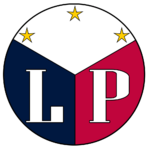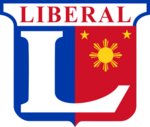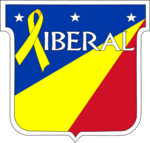Liberal Party (Philippines) facts for kids
Quick facts for kids
Liberal Party
Partido Liberal ng Pilipinas
|
|
|---|---|
 |
|
| President | Erin Tañada (Acting) |
| Chairman | Francis Pangilinan |
| Spokesperson | Leila M. de Lima |
| Secretary-General | Teodoro Baguilat, Jr. |
| Founded | January 19, 1946 |
| Split from | Nacionalista |
| Headquarters | AGS Building, EDSA, Guadalupe Viejo, Makati City, NCR |
| Think tank | Center for Liberalism and Democracy |
| Youth wing | Liberal Youth |
| Sectoral organization | Mamamayang Liberal |
| Membership (February 2025) | 20,000 |
| Ideology |
|
| Political position | |
| National affiliation | KiBam (2025) Former:
UNIDO (1980–1986)
Laban (1987) Koalisyong Pambansa (1992) PPC (2001) K4 (2004) Genuine Opposition (2007) Liberal (2010) Team PNoy (2013) Daang Matuwid (2016) Otso Diretso (2019) TRoPa (2022) |
| Regional affiliation | Council of Asian Liberals and Democrats |
| International affiliation | Liberal International |
| Colors | Yellow, red, blue Buff (customary) |
| Slogan | Bago. Bukas. Liberal. (since 2020) |
| Senate |
1 / 24
|
| House of Representatives |
6 / 317
|
| Provincial governors |
2 / 82
|
| Provincial vice governors |
1 / 82
|
| Provincial board members |
14 / 840
|
The Liberal Party of the Philippines (Filipino: Partido Liberal ng Pilipinas, LP) is a major political party in the Philippines. It believes in liberal ideas, which focus on individual rights and freedoms.
The party was started on January 19, 1946, by Manuel Roxas, Elpidio Quirino, and José Avelino. They broke away from the older Nacionalista to form their own group. The Liberal Party is the second-oldest active political party in the Philippines. It is also the oldest party that has been continuously active.
The Liberal Party has been the ruling party for four Philippine presidents: Manuel Roxas, Elpidio Quirino, Diosdado Macapagal, and Benigno Aquino III.
The party strongly opposed the government of Ferdinand Marcos. After the People Power Revolution in 1986, the Liberal Party became a major political force again. It was a key part of President Corazon Aquino's coalition. The party became very popular again after Corazon Aquino passed away in 2009. It won the 2010 Philippine presidential election with Benigno Aquino III as president. This brought the party back to power from 2010 to 2016.
This was the only time the party won the presidency after the Marcos era. In the 2016 election, it lost the presidency to Rodrigo Duterte. However, its vice presidential candidate, Leni Robredo, won the vice presidency.
The Liberal Party was the party of the most recent Vice President of the Philippines. In the 2019 elections, it remained the main opposition party. It held three seats in the Senate. The Liberals were the largest party outside of the ruling coalition. They held 18 seats in the House of Representatives after 2019. In local governments, the party had two provincial governors and five vice governors. However, the 2022 general election was a tough time for the party. It lost both the presidency and vice presidency. It also lost all its seats in the Senate. Its representation in the House of Representatives was reduced.
The Liberals are still an important group in Philippine politics today. They support moderate ideas on social issues. They also have balanced views on economic issues. The party is often linked to the democratic system that came after the revolution. This is different from governments that are too strict or too traditional. Besides presidents, important leaders like Benigno Aquino Jr., Jovito Salonga, and Mar Roxas have led the party. Two members, Corazon Aquino and Leila de Lima, received the Prize For Freedom. This is a top international award for liberal and democratic politicians. The Liberals are part of the Council of Asian Liberals and Democrats and Liberal International.
Contents
- Party History
- What the Liberal Party Believes In
- Current Political Ideas
- Liberal Presidents
- Party Leadership
- Notable Liberals
- See also
Party History
Early Years: 1946-1957
Manuel Roxas Becomes President
The Liberal Party began as a group within the Nacionalista Party. This group was called the "Liberal Wing." It was led by Manuel Roxas and Elpidio Quirino. Roxas wanted to run for president in the 1946 Philippine presidential election. When the Nacionalista Party chose Sergio Osmeña as their candidate, Roxas and Quirino officially formed the Liberal Party. This happened on January 19, 1946.
Roxas ran for president and Quirino for vice president. They won against Osmeña. After this, the Liberal Party won most of the seats in the House elections. They also won many seats in the Senate election in 1947.
Elpidio Quirino Takes Over
President Roxas passed away on April 15, 1948. Vice President Elpidio Quirino then became president.
In the 1949 elections, Quirino ran for president again. He chose Fernando Lopez as his vice president. They won the election. However, this election was known for being very difficult.
Challenges in the 1950s
For the 1953 elections, a popular Liberal member named Ramon Magsaysay wanted to be the party's presidential candidate. But President Quirino also wanted to run again. Magsaysay then left the Liberal Party and joined the Nacionalista Party.
Quirino's campaign faced many problems. Magsaysay and his running mate Carlos Garcia won the election by a large margin. The Liberal Party did not win any seats in the Senate that year. They also won fewer seats in the House.
From Garcia to Macapagal: 1957-1965
Diosdado Macapagal Rises
After Magsaysay passed away, Carlos P. Garcia became president. In the 1957 presidential elections, the Liberal Party chose José Yulo for president and Diosdado Macapagal for vice president. Yulo lost to Garcia. But Macapagal won the vice presidency. This was the first time a president and vice president came from different parties.
Liberal Party Wins in 1961
For the 1961 elections, Ferdinand Marcos wanted to be the Liberal Party's presidential candidate. But Vice President Macapagal also wanted the nomination. They agreed that Macapagal would run for president. Marcos became the new party president. Macapagal and his running mate Emmanuel Pelaez won the election against Garcia.
Marcos Era and Martial Law
Marcos Leaves the Party
In 1965, President Macapagal planned to run for re-election. Ferdinand Marcos then left the Liberal Party in April 1964. He joined the Nacionalista Party and became their presidential candidate. Macapagal chose Gerardo Roxas, the son of the party's founder, as his running mate. Macapagal and Roxas lost to Marcos.
Ninoy Aquino's Rise
In the 1967 elections, Ninoy Aquino was the only Liberal candidate to win a Senate seat. He was a former Nacionalista member.
Challenging Marcos's Rule
During the time leading up to Marcos's declaration of martial law, the Liberal Party strongly opposed him. Leaders like Ninoy Aquino, Gerry Roxas, and Jovito Salonga spoke out against Marcos. They talked about human rights and limits on freedoms. Even after Marcos declared martial law, the party continued to oppose his government. Many of its leaders and members faced difficulties during this time.
Elections During Martial Law
For the 1978 elections, some Liberal members joined a group that supported the government. Others joined Ninoy Aquino's Lakas ng Bayan (LABAN). Many Liberals chose not to be involved in politics during this period.
In 1981, Marcos lifted martial law. The Liberal Party joined the United Nationalist Democratic Organization (UNIDO). This was the main group of opposition parties. However, UNIDO and LABAN decided to boycott the election. They felt Marcos did not meet their demands for fair elections.
The 1986 Snap Elections
Liberal Party members joined UNIDO and other parties. They supported Cory Aquino and Doy Laurel for the 1986 election. This election had many problems. The victory of Marcos led to the People Power Revolution on February 25 of the same year.
After the Revolution: 1986-2010
Under Aquino's Government
After democracy was restored, some Liberal Party leaders helped end the presence of US military bases in the Philippines. They campaigned in the 1991 Senate to reject a new treaty. This decision, however, caused the party to lose many seats in the 1992 elections.
Elections in the 1990s
In 1992, the Liberal Party supported Jovito Salonga for president. He lost to Fidel V. Ramos. In 1998, the Liberal Party chose Manila Mayor Alfredo Lim as their presidential candidate. He also lost.
People Power II
In 2000, the Liberal Party opposed the government of Joseph Estrada. They actively supported efforts that led to the People Power II. This event removed Estrada from the presidency.
Joining Coalitions
After Estrada left office, the Liberal Party joined the new government's coalition for the 2001 elections. In the 2004 elections, the Liberal Party joined President Arroyo's coalition. Mar Roxas, son of Gerry Roxas, and Senator Rodolfo Biazon were their candidates. Both won.
Opposition and Leadership Changes
After some issues with the Arroyo government, many Liberal members joined the opposition. For the 2007 elections, the Liberal Party put forward Noynoy Aquino, the son of Ninoy and Cory. He won a Senate seat.
The Liberal Party also had some internal leadership challenges. Eventually, Noynoy Aquino became the party president.
Liberal Party's Return to Power: 2010-2016
Noynoy Aquino's Presidency
The Liberal Party became very influential again when it nominated Senator Benigno Aquino III for president in the 2010 Philippine presidential election. This happened after his mother, former President Corazon Aquino, passed away. Many people supported his candidacy. Although Mar Roxas was initially the party's presidential candidate, he stepped aside for Aquino and ran for vice president instead.
Aquino won the presidency. The Liberal Party became the majority party in Congress.
2016 Elections
In the 2016 presidential elections, the Liberal Party nominated Mar Roxas for president. They chose Leni Robredo for vice president. Roxas lost to Rodrigo Duterte. However, Robredo won the vice presidency. After this, many party members either joined Duterte's party or became part of the opposition.
Liberal Party in Opposition: 2016-Present
After 2016
After losing the 2016 elections, the Liberal Party focused on rebuilding. They invited people who were not politicians to join the party. Senator Leila de Lima, a Liberal member, was arrested in 2017. The party said this was unfair and a way to silence those who opposed the president.
2019 Elections
Before the 2019 elections, the Liberal Party formed a group called Otso Diretso. This group had eight candidates for the Senate. However, none of the eight candidates won a seat. This was a significant loss for the party.
2022 Elections and Beyond
For the 2022 presidential election, the Liberal Party nominated Leni Robredo for president and Francis Pangilinan for vice president. Robredo ran as an independent but was still connected to the Liberal Party. Both candidates lost the election. No candidate from the party won a seat in the Senate.
In May 2024, Bam Aquino left the Liberal Party to run for Senate as an independent. Later, he joined another party and became its chair. Also in 2024, some Liberals, led by Leila de Lima, formed a new group called Mamamayang Liberal (ML). This group aims to win seats in the House of Representatives for party-list representatives in 2025. De Lima was chosen as ML's first candidate.
Kiko Pangilinan was the Liberal Party's only candidate for the Senate elections in 2025. Pangilinan and the Liberals formed a partnership with Bam Aquino's new party. This group is called KiBam. In the 2025 Senate election, both Bam Aquino and Kiko Pangilinan won seats. They returned to the Senate. Mamamayang Liberal also won a party-list seat in the House of Representatives.
What the Liberal Party Believes In
The Liberal Party says its main belief is social liberalism. This means they support individual freedoms and social fairness. The party is often described as a "centrist" or "liberal" party. In the past, it was seen as similar to the Nacionalista Party. But during the Marcos government, it became more focused on liberal ideas.
The party is a founding member of the Council of Asian Liberals and Democrats and a full member of Liberal International. It believes in "freedom, justice and solidarity (bayanihan)." These values became very clear when the party opposed the Marcos government.
Since 2017, the party has allowed anyone to become a member. This helps them connect with more people and build a larger group of volunteers. They want to become a "true people's party."
Party Symbols
The Liberal Party is linked to the color yellow. Yellow is often used by liberal political groups. During the People Power Revolution, groups against the Marcos government used yellow ribbons. This showed their resistance and support for Ninoy Aquino. His son, Benigno Aquino III, also used yellow for his presidential campaign in 2010, which he won.
After his presidency, yellow continued to be linked to the party. It became the main opposition party against Rodrigo Duterte. The term dilawan (meaning "yellowed ones") was sometimes used negatively against the party. To move away from this negative meaning and unite different opposition groups, then-party chair Leni Robredo used the color pink for her presidential campaign. Today, both pink and yellow are used by the party.
Current Political Ideas
The Liberal Party has policies that aim for inclusiveness and people empowerment. They support secure jobs, food, shelter, universal health care, and access to public education. They are against extrajudicial killings, challenges to the rule of law, and limits on human rights. The party also wants an open government with participatory democracy.
Economic Policy
- Improve help for people in need.
- Consider a 1% wealth tax on very rich individuals.
- Create tax exemptions for certain products.
- Use government money to help reduce poverty.
- Increase minimum wages.
- Improve education, increase its budget, and create special education (SPED) centers.
- Improve universal health care and support barangay health workers.
- Prioritize infrastructure for rural development, transportation, and climate resilience.
- Invest in science and technology and promote data-driven agriculture.
- Support renewable energy and better waste disposal.
- Focus on job programs and expand social security benefits.
- Promote financial literacy.
- Offer programs to help students access private colleges.
- Create laws for equal participation of women in the economy and leadership.
- Address corruption in government.
Social Policy
- Work for cleaner air and water.
- Promote sustainable farming.
- Develop extensive programs against climate change.
Liberal Presidents
The Liberal Party has had four presidents. Presidents who won under other parties are not included here.
| # | Name (lifespan) | Portrait | Province | Presidency start date |
Presidency end date |
Time in office |
|---|---|---|---|---|---|---|
| 3 | Manuel Roxas (1892–1948) |
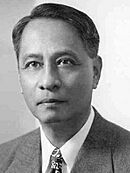 |
Capiz | May 28, 1946 | April 15, 1948 | 1 year, 323 days |
| 4 | Elpidio Quirino (1890–1956) |
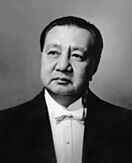 |
Ilocos Sur | April 17, 1948 | December 30, 1953 | 5 years, 257 days |
| 9 | Diosdado Macapagal (1910–1997) |
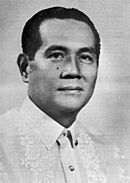 |
Pampanga | December 30, 1961 | December 30, 1965 | 4 years, 0 days |
| 15 | Benigno Aquino III (1960–2021) |
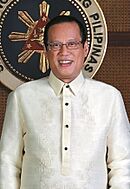 |
Tarlac | June 30, 2010 | June 30, 2016 | 6 years, 0 days |
Party Leadership
Current Party Officials
- President: Vacant
- Vice President and Acting President: Erin Tañada, former representative for Quezon's 4th district (2022–present)
- Chairperson: Francis Pangilinan, Senator (2022–present)
- Vice Chairperson: Kit Belmonte, former representative for Quezon City's 6th district (2022–present)
- Secretary-General: Teddy Baguilat, former representative for Ifugao's lone district (2022–present)
- Treasurer: Alfonso Umali Jr., representative for Oriental Mindoro's 2nd district (2022–present)
- Spokesperson: Leila de Lima, Mamamayang Liberal representative (2023–present)
Party Presidents Through the Years
| # | Name | Start of term | End of term |
|---|---|---|---|
| 1 | Manuel Roxas | January 19, 1946 | April 15, 1948 |
| 2 | José Avelino | April 19, 1948 | May 8, 1949 |
| 3 | Elpidio Quirino | April 17, 1949 | December 30, 1950 |
| 4 | Eugenio Pérez | December 30, 1950 | December 30, 1957 |
| 5 | Diosdado Macapagal | December 30, 1957 | January 21,1961 |
| 6 | Ferdinand E. Marcos | January 21, 1961 | April 1964 |
| 7 | Cornelio T. Villareal | April 1964 | May 10, 1969 |
| 8 | Gerardo Roxas | May 10, 1969 | April 19, 1982 |
| 9 | Jovito Salonga | April 20, 1982 | June 1, 1993 |
| 10 | Wigberto Tañada | June 2, 1993 | October 17, 1994 |
| 11 | Raul A. Daza | October 18, 1994 | September 19, 1999 |
| 12 | Florencio Abad | September 20, 1999 | August 9, 2004 |
| 13 | Franklin Drilon | August 10, 2004 | November 5, 2007 |
| 14 | Mar Roxas | November 6, 2007 | September 30, 2012 |
| 15 | Joseph Emilio Abaya | October 1, 2012 | August 7, 2016 |
| 16 | Francis Pangilinan | August 8, 2016 | September 30, 2022 |
| 17 | Edcel Lagman | September 30, 2022 | January 30, 2025 |
| Act | Erin Tañada | January 30, 2025 |
Notable Liberals
Philippine Presidents
- Manuel Roxas (5th President of the Philippines; one of the co-founders)
- Elpidio Quirino (6th President of the Philippines) – also the 2nd Vice President of the Philippines
- Ramon Magsaysay (7th President of the Philippines) – Magsaysay won in 1953 as a Nacionalista candidate. He was a former Liberal member and served as President Quirino's Secretary of National Defense.
- Diosdado Macapagal (9th President of the Philippines)
- Ferdinand Marcos Sr. (10th President of the Philippines) – Marcos won in 1965 as a candidate of the Nacionalista Party. He joined this party after not getting the Liberal nomination from Macapagal.
- Joseph Estrada (13th President of the Philippines) – He was a member of the Liberal Party when he was a senator from 1987 to 1991.
- Benigno Aquino III (15th President of the Philippines)
- Rodrigo Duterte (16th President of the Philippines) – He was a former party leader in Davao City from 2009. Duterte left the party in 2015. He won the presidency in 2016 under the PDP–Laban party.
Philippine Vice Presidents
- Fernando Lopez (3rd and 7th vice president of the Philippines) – Lopez was a Liberal when he was the 3rd Vice President. He was a Nacionalista member as the 7th Vice President.
- Emmanuel Pelaez (6th vice president of the Philippines)
- Leni Robredo (14th vice president of the Philippines)
Others
- List of Liberal Party (Philippines) members
See also
 In Spanish: Partido Liberal de Filipinas para niños
In Spanish: Partido Liberal de Filipinas para niños
- Democratic Party (Philippines), a party that broke away from the Liberal Party from 1953 to 1957.
 | Audre Lorde |
 | John Berry Meachum |
 | Ferdinand Lee Barnett |


